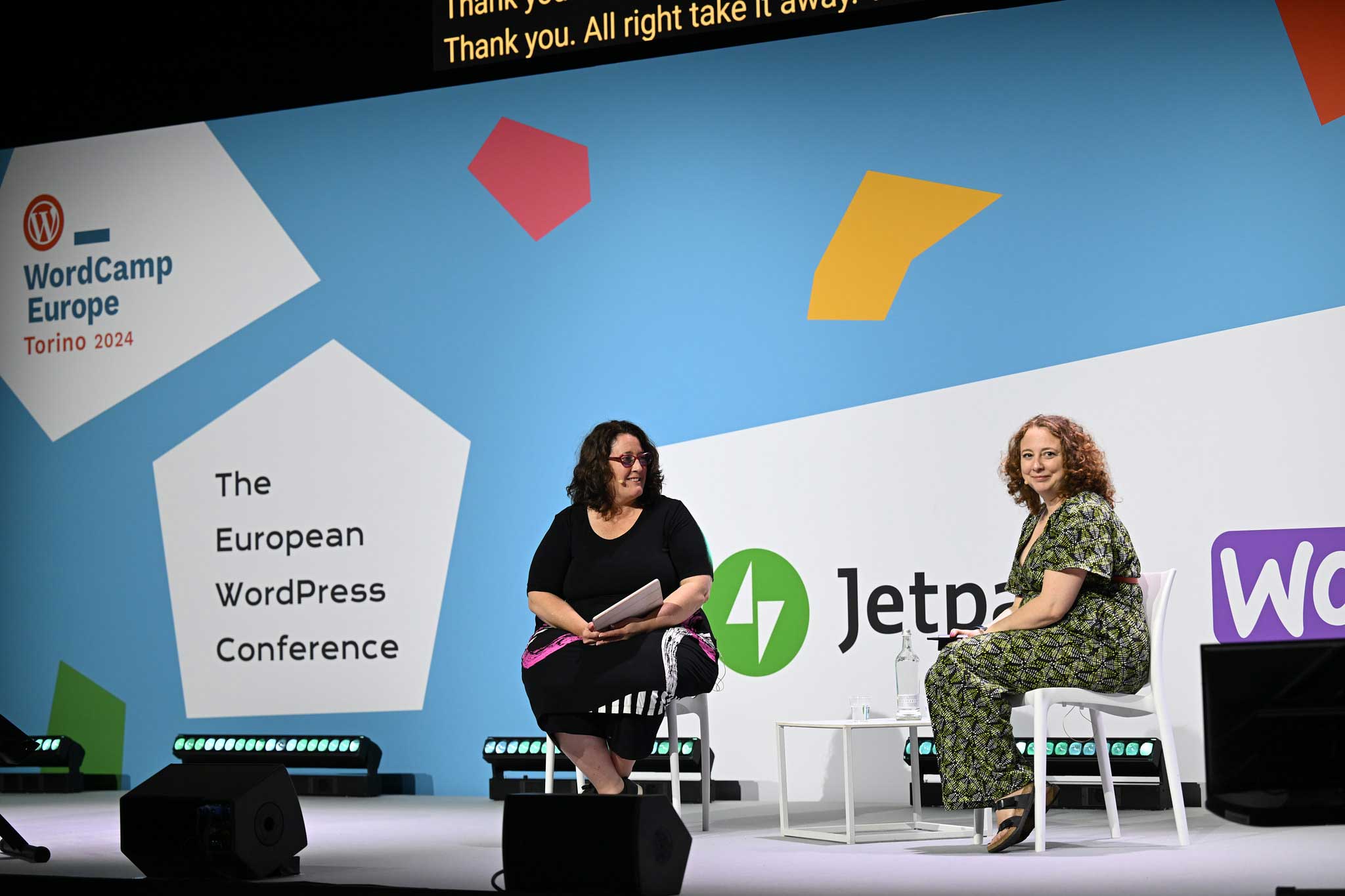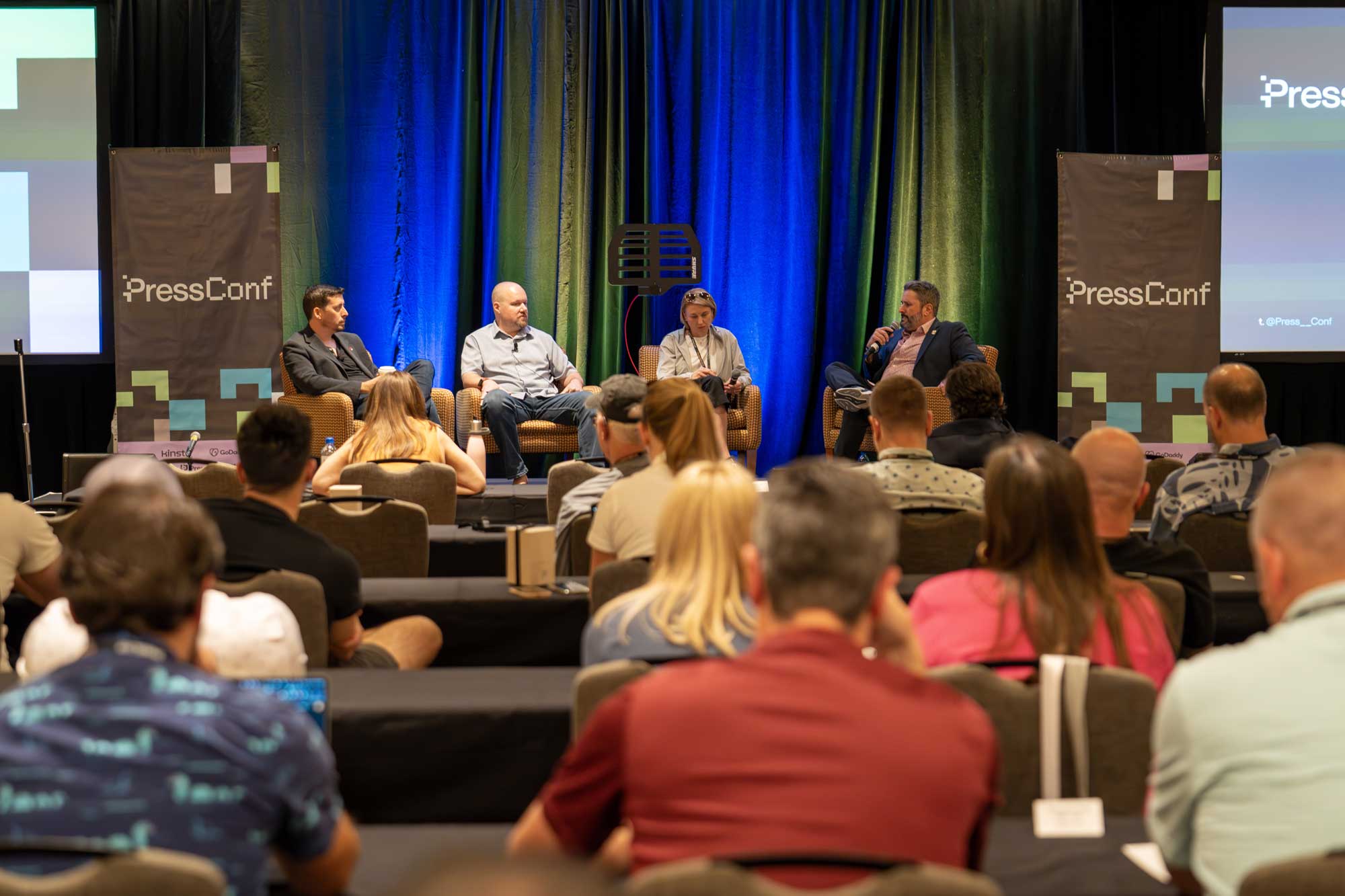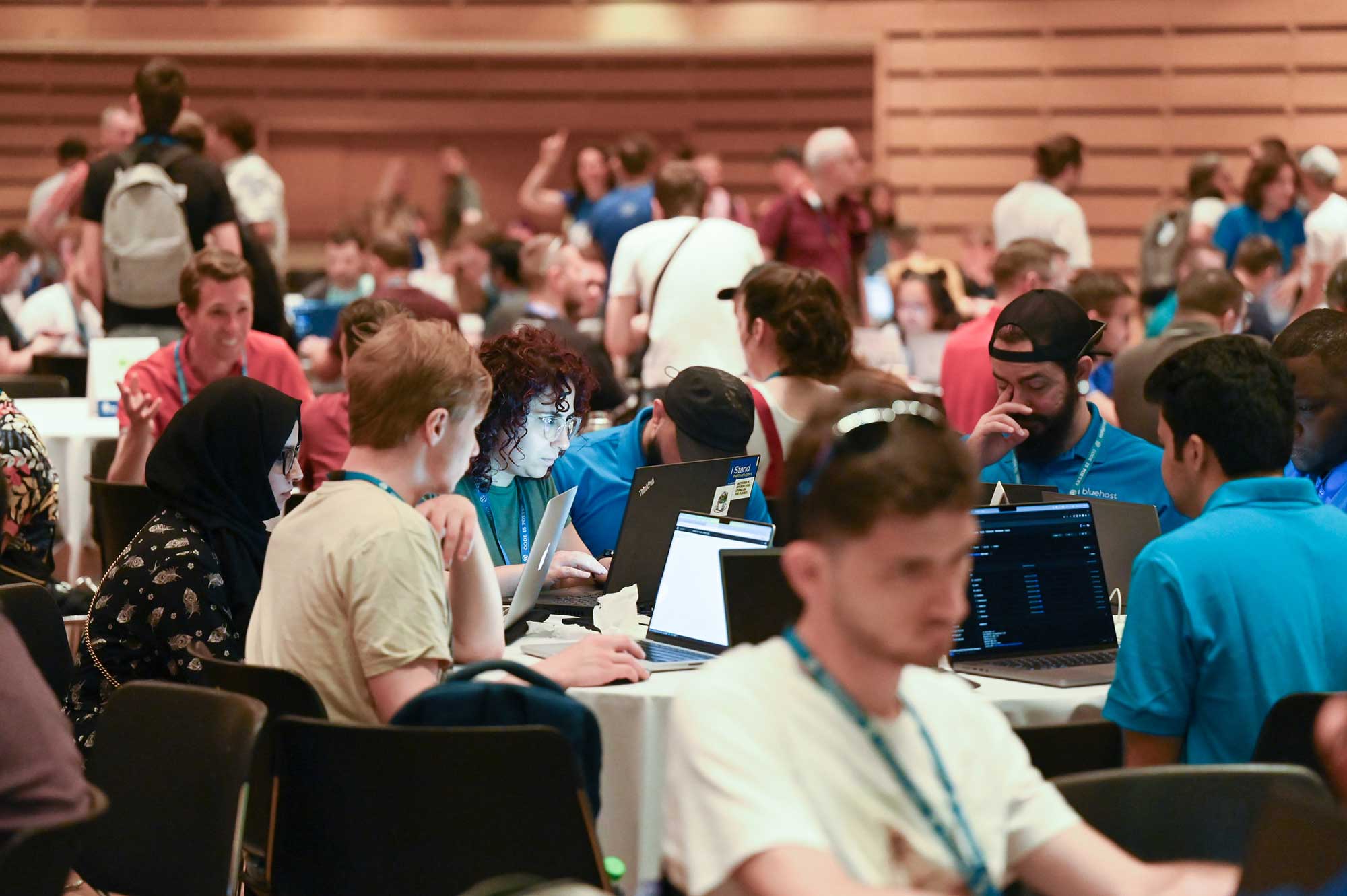When WP Includes launched its Gender Equality in WordPress Businesses report at WordCamp US last September, it landed with barely a ripple. Co-authored by WP Includes co-founder Siobhan McKeown and The Repository’s Rae Morey, the study was the first of its kind—offering a data-driven look at gender disparities in WordPress businesses, along with practical recommendations for change.
Yet, its release was almost entirely overshadowed. Just days later, Matt Mullenweg’s controversial WordCamp US keynote ignited a firestorm of debate, diverting attention from other discussions. In the aftermath, the report—and its urgent findings on gender inequality, workplace bias, and barriers to leadership—failed to gain traction.
Now, with International Women’s Day approaching, its findings remain just as relevant. Women are still severely underrepresented in WordPress business leadership: only 4% of Five for the Future companies are led by women, and most businesses in the ecosystem remain male-dominated at the highest levels. Workplace challenges—including bias, harassment, and a lack of career progression opportunities—further reinforce the systemic barriers women face.
While the report laid out clear and urgent challenges, six months on, little has changed. I spoke with McKeown about why WordPress businesses continue to ignore the problem and the broader suppression of DEI efforts in tech. She didn’t hold back—criticizing the project’s leadership for fostering a culture far from open and inclusive, punishing dissent, and driving away those who once worked to make it better.
But first, the findings.
The findings: The stark reality for women in WordPress businesses
The Gender Equality in WordPress Businesses report, based on survey responses from 323 people across more than 90 WordPress businesses, paints a bleak picture of gender imbalance in leadership and workplace culture.
Leadership Disparities: Few Women at the Top
- Only 4% of companies that have pledged to WordPress’s Five for the Future initiative have a woman in their top leadership role.
- Only 5 of the 69 WordPress VIP Agency partners have a woman in their top leadership role.
- More than half of survey respondents report to a male manager, with only 1 in 5 having a female manager.
Workplace Bias and Discrimination
- Nearly a quarter of women surveyed said they have experienced bullying, harassment, and/or discrimination due to their gender in their workplace, compared to 4% of men.
- One in five women have had their judgment questioned due to their gender, compared to 1% of men.
- 55% of those surveyed report to a man, and only 24% to a woman.
The ‘Broken Rung’ Effect: Women Struggle to Enter Leadership
The report highlighted both a ‘glass ceiling’ (keeping women from top positions) and a ‘broken rung’ (preventing women from stepping into leadership roles at all).
- Men are almost twice as likely as women to believe they have good career progression opportunities.
- Sponsorship and mentorship programs—which have been proven to help women advance—are rarely implemented in WordPress businesses.
- Women are three times more likely than men to spearhead gender equality efforts in their workplace, adding extra, unpaid labor to their roles.
The report doesn’t just highlight problems—the bulk of the report offers practical recommendations for businesses, including:
- Making gender equality a leadership priority rather than just an HR initiative.
- Fixing the ‘broken rung’ by offering sponsorship, leadership training, and career progression opportunities to women.
- Fostering an inclusive and respectful culture with clear policies to address harassment and bias.
- Providing family-friendly benefits such as flexible work arrangements and paid parental leave.
Q&A with Siobhan McKeown, co-founder of WP Includes
Question: The Gender Equality in WordPress Businesses report was launched at WordCamp US last year but didn’t get much attention at the time. What was your reaction to the lack of engagement from the community?
Siobhan McKeown: It was very disappointing. The report had important information for the WordPress community about a) the current state of diversity, equity and inclusion (DEI) in WordPress businesses, and b) practical advice about how companies can improve. We had a great opportunity to build some momentum at WordCamp US and to both speak to and support organizations to make improvements.
However, events at WordCamp US in 2024 overshadowed the report and its message. It’s understandable that business leaders and owners looked to their own business stability in light of what happened there, and have been focused on making sure that they could weather the storm. I personally found, and continue to find, the events that took place very destabilizing and so I have full empathy for everyone else who has been navigating that.
But it is a shame that there is no space at the minute for important and relevant work that aims to improve the community for everyone. This is particularly the case when, in the wider landscape, DEI initiatives are being shut down, trans people are having their rights obliterated, and women are being encouraged to take more traditional roles. We need this conversation more than ever, but all air in the community is taken up by other matters.
Question: Why do you think gender equality hasn’t been a more prominent discussion within WordPress businesses?
Siobhan: Same as above. But it’s hard to say what would have happened if the situation hadn’t unfolded the way it did. Would people have taken the report seriously then? I like to think so, but I really don’t know.
Question: The report found that only 4% of Five for the Future companies are led by women, and that women are significantly underrepresented in leadership across WordPress businesses. What are the biggest factors contributing to this disparity?
Siobhan: Many WordPress businesses are small and medium-sized enterprises (SMEs) and founder-led. Most of these founders took their first steps in the early days of WordPress. While there were women in the community, the trend throughout the 2000s and 2010s was for these businesses to be founded by young men who had both the encouragement to pursue STEM subjects in school and the time and opportunity to contribute to open source.
In many of these companies, the only C-level executives are the founders—especially when it comes to the CEO role. Where this isn’t the case, it’s usually because the company has grown significantly, as seen with Newfold Digital (and its subsidiaries) and WP Engine, or because the original CEO has stepped down and been replaced by a woman, as in Dekode’s case.
That said, there are SMEs founded by women, such as Barn2 Plugins and Valet, but they remain the exception rather than the rule.
Question: Has there been any response from WordPress businesses since the report’s release? Have you seen any positive steps taken toward change?
Siobhan: Sadly, no. Aside from a few supporters, we’ve mostly been met with silence.
That said, producing the report has made me reflect on how I can better support not just women, but also non-binary people and other underrepresented groups within my organizations. I’ve always considered myself a feminist, assuming that my beliefs naturally played out through my actions. But that’s not enough.
I’ve become much more intentional—actively identifying women I can sponsor, advocating for them when they’re not in the room, pushing for more inclusive policies where needed, and offering support and advice through WP Includes.
Question: The WordPress ecosystem prides itself on being open and inclusive, yet these findings suggest otherwise, at least in business leadership. What do you think is the disconnect between WordPress’s open-source culture and the reality for women working in WordPress companies?
Siobhan: I want to challenge the premise of your question—that the WordPress ecosystem is open and inclusive. For many years, it certainly seemed that way, but recent events have proven otherwise. While individual contributors and smaller communities within WordPress may be welcoming, we’ve reached a point where dissent is punished and those who speak up are banned from the central project. That is not open or inclusive—it’s the opposite.
The WordPress project has largely been led by men. While several notable women leaders have made significant contributions, the reality behind closed doors has remained unchanged. What we are witnessing today is not new—it has always been this way. The emotional labor of these incredible women (and some men) has held things together, created the welcoming spaces we cherish, driven critical changes in the software and the broader project, and made it possible for people to speak up. And yet, tellingly, none of these women are involved in the project anymore. Despite their efforts, it’s now undeniable that the project is not truly open or inclusive—many are unwelcome, and speaking up carries consequences.
This mirrors the experience of women in business. A company may present itself as open and inclusive—its marketing materials and social media portray a commitment to diversity and equity. But in practice, women often feel unable to voice concerns, struggle to see clear pathways for advancement, or report to managers who are indifferent to their challenges. Too often, codes of conduct apply to everyone—except those with real power. Women and other marginalized groups pour enormous, often unrecognized effort into making workplaces more equitable, only to see those efforts treated as ‘nice-to-have’—quickly discarded when the company’s true priorities come into play.
So, to return to your question: there is a strong connection between WordPress’ culture and the experience of working in WordPress businesses. The tragedy is that it’s the worst aspects of both that are reflected in each other.
Question: Can you share what you’re doing via WP Includes to address the issues identified in the report?
Siobhan: Not as much as we’d like! Like many women, I have a full-time job that demands a lot of energy, and my two fantastic children take up the rest. I’d love to do more with WP Includes, but life’s realities get in the way. The truth is, we’re ambitious women in every aspect of our lives, and our biggest priorities—our careers, caring for our families, and earning a living—take up most of our time. (Which, again, highlights how open-source contribution tends to favor those with time and often excludes those with caregiving responsibilities.)
At WP Includes, we can’t force WordPress businesses to change—they need to be willing to reflect, ask the right questions, and commit to progress. But what we can do is support and empower the women within these businesses, helping them reach their goals. And in doing so, we raise the bar for everyone.
That said, we currently have our second cohort underway and the mentors are having active discussions about how to best support their mentees. I love to see these conversations happen about how we can mutually support one another to achieve our goals. The enthusiasm of the group is a big accelerant for me.
Since time is our biggest constraint, we’ve developed a business plan to incorporate WP Includes as a non-profit. We’re currently assessing whether this is feasible—whether we can secure enough funding and have the capacity to set it up properly. If we move forward, we plan to hire a staff member to help us expand our efforts: welcoming a new cohort twice a year, running ongoing business training events for our members, offering travel grants, and hosting side events at major WordCamps.
Just to close: groups like WP Includes have become more important than ever. We live in a time when DEI initiatives are being shut down and calls are made for masculine energy, when men (mostly men, with obvious exceptions) are dismantling the world. Part of their ideology is that women should take on more “traditional” roles. We must resist this.
Feature image credit: Chris Clark.









Comments
One response to “Who Leads WordPress Businesses? The Data Confirms It’s (Still) Not Women”
Thanks for that great post/interview.
I’m quite proud to work in a company of 27 people led by a woman and where 3 of the 5 board members are women.
That being said, this 4% rate is really ridiculous and as a member of the WordPress community, I feel pretty ashamed of it 🙁